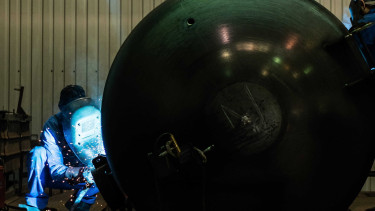COVID-19 vaccine for children under 5 may arrive soon

Coronavirus vaccines for children younger than five could be available far sooner than expected — perhaps by the end of February — under a plan that would lead to the potential authorization of a two-shot regimen in the coming weeks, The Washington Post reported, citing people briefed on the situation as saying on Monday.
Pfizer and its German partner, BioNTech, the manufacturers of the vaccine, are expected to submit to the Food and Drug Administration as early as Tuesday a request for emergency-use authorization for the vaccine for children 6 months to 5 years old, which would make it the first vaccine available for that age group. Older children already can receive the shot.
Reuters reported late on Tuesday that the companies said they began submitting data for an emergency use authorization even though they did not meet a key target in their clinical trial of 2- to 4- year olds. They are submitting the data at the request of the U.S. Food and Drug Administration in order to address an urgent public health need in the age group, they said.
Having a safe and effective vaccine available for children in this age group is a priority,
acting FDA Commissioner Janet Woodcock said. She said the agency asked for the application because of the recent Omicron surge.
The FDA said an outside committee of expert advisers would meet on 15 February to discuss the authorization. If that goes forward, the U.S. Center for Disease Control and Prevention (CDC) also needs to sign off on how the vaccinations will be implemented, following a meeting of its own advisers. Those meetings have tended to follow within a week or so of FDA decisions.
The drug companies said they are asking the FDA for authorization of the first two doses of a planned three-dose regimen.
If two doses are authorized, parents will have the opportunity to begin a COVID-19 vaccination series for their children while awaiting potential authorization of a third dose,
Pfizer Chief Executive Albert Bourla said.
He said the company believes three doses of the vaccine will be needed "to achieve high levels of protection against current and potential future variants."
The companies expect to complete submitting data to the FDA in the coming days, with data on the third dose to follow.
Pfizer and BioNTech are testing a 3-microgram dose of the vaccine in the age group, compared with a 10-microgram dose in 5- to 11-year-olds and 30 micrograms for people aged 12 and older.
The companies said they expect to have ample supply of the 3-microgram shots should the FDA authorize the vaccine.
Evidence of clinical benefit?
In December, Pfizer and BioNTech announced that two doses of the vaccine in 2-, 3- and 4-year-olds did not trigger an immune response comparable to what was generated in teens and adults (16 to 25). But the two-shot regimen did create a protective immune response in children aged 6 to 24 months in line with 16- to 25-year olds. That’s when drugmakers added a third shot to the trial to try to improve the immune response, a crushing blow to many pediatricians and parents who would now have to wait several more months to protect children.
But data on a third shot will not be available until at least late March. Once that information is submitted, regulators are expected to authorize a third dose of the pediatric vaccine.
“We know that two doses isn’t enough, and we get that,” said one of the people familiar with the situation. “The idea is, let’s go ahead and start the review of two doses. If the data holds up in the submission, you could start kids on their primary baseline months earlier than if you don’t do anything until the third-dose data comes in.”
While those demanding the vaccine have been vocal, vaccine uptake among children who are already eligible has been slow — and some pediatricians fear that acceptance will be lower in younger age groups. In areas where shots have been available to 5- to 11-year-olds since early November, more than 70%of eligible children have not gotten a single shot, according to the Kaiser Family Foundation.
According to the latest data (early January), only 10% of children aged 5 to 11 have been inoculated against coronavirus in Hungary.
Cover photo: MTI/Zoltán Balogh











